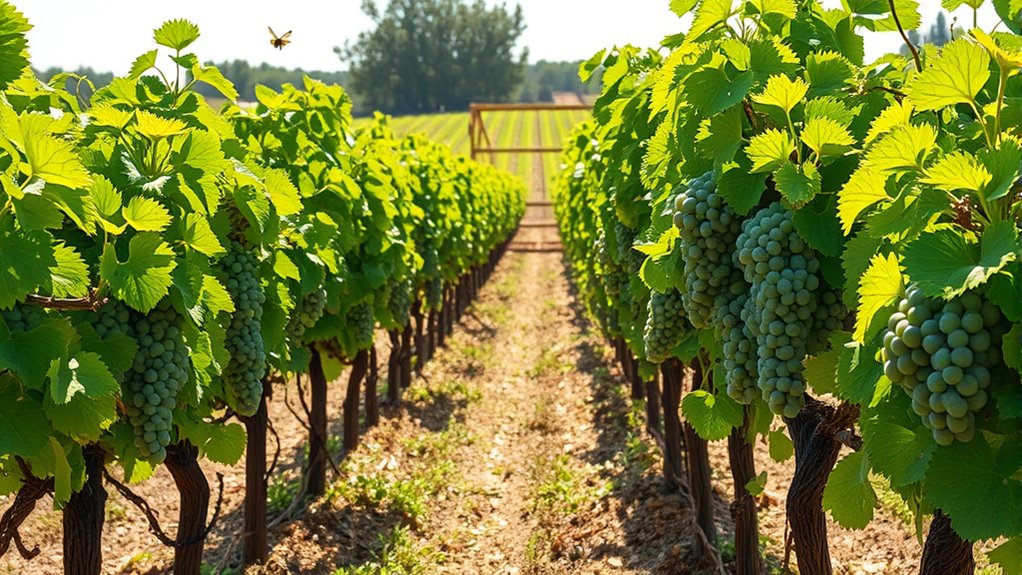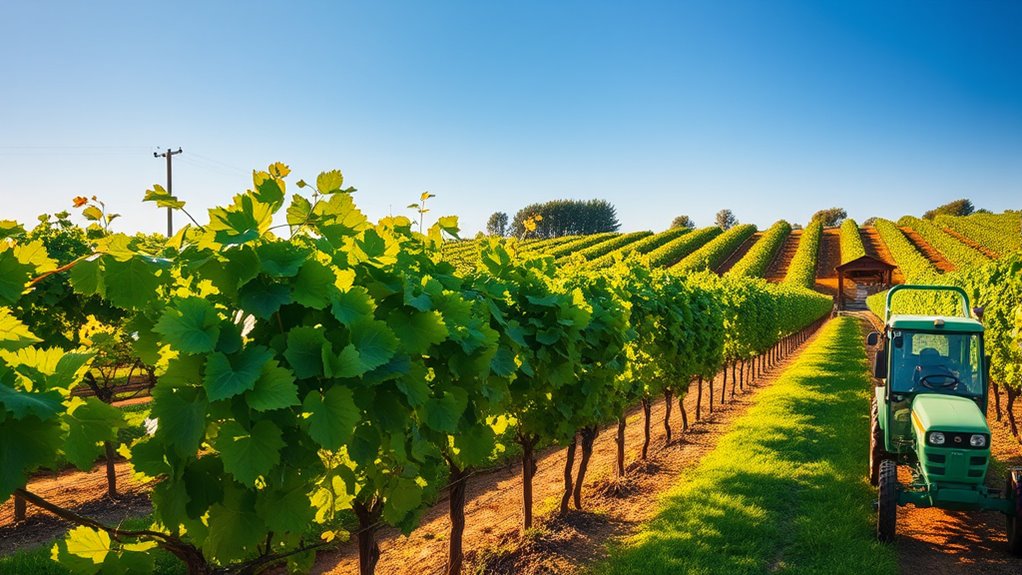Sustainable wine production with biodynamic and organic practices focuses on working harmoniously with nature. You avoid synthetic fertilizers and pesticides, instead enriching soils with organic matter and encouraging beneficial microorganisms. Techniques like cover cropping, crop rotation, and natural pest control help protect the environment and promote healthy vines. This approach enhances soil resilience, supports biodiversity, and results in wines that genuinely express their terroir. Exploring these practices reveals how they shape a more responsible and flavorful future for wine.
Key Takeaways
- Biodynamic and organic practices prioritize soil health through organic matter enrichment and natural amendments, avoiding synthetic chemicals.
- These methods promote microbial activity and soil resilience, enhancing vine vitality and long-term vineyard sustainability.
- Integrated pest management replaces chemicals with natural predators, cover cropping, and biodiversity to control pests sustainably.
- Sustainable practices improve water retention, reduce erosion, and support ecosystems, resulting in healthier vines and authentic wine flavors.
- They lower environmental impact by reducing carbon emissions and fostering eco-friendly vineyard operations aligned with nature.

Sustainable wine production is gaining popularity as wineries seek to reduce their environmental impact while maintaining quality. One of the key aspects of this approach involves nurturing soil health, which forms the foundation for healthy grapevines and high-quality wine. When you focus on improving soil health, you’re not just enriching the soil with organic matter; you’re also encouraging beneficial microorganisms that naturally suppress pests and diseases. By avoiding synthetic fertilizers and chemicals, you help preserve the soil’s natural structure and fertility, making it more resilient over time. Healthy soil promotes better water retention, reduces erosion, and creates a balanced ecosystem that supports the vines’ growth without relying heavily on external inputs. This holistic approach to soil management aligns with biodynamic and organic principles, emphasizing the importance of working with nature rather than against it. Additionally, the use of electric bikes in vineyard management can facilitate sustainable practices by reducing carbon emissions during vineyard operations.
Pest management is another critical component of sustainable wine production. Instead of turning to chemical pesticides, which can harm beneficial insects, pollute waterways, and disrupt soil ecosystems, you adopt integrated pest management (IPM) strategies. These involve monitoring pests closely and employing targeted, environmentally friendly methods to control infestations. For example, you might introduce natural predators, such as ladybugs or predatory mites, to keep pest populations in check. Cover cropping and maintaining biodiversity in the vineyard also serve as natural pest deterrents by attracting beneficial insects that prey on harmful pests. Additionally, practices like crop rotation and soil enrichment can strengthen vine resilience, making them less vulnerable to pests and diseases. By focusing on preventive measures and biological controls, you reduce the need for chemical interventions, creating a vineyard environment that’s healthier for the land, the workers, and consumers.
As you implement these sustainable practices, you’re not only protecting the environment but also enhancing the quality of your grapes. Healthy soil and effective pest management lead to more balanced vine growth and better fruit expression, which translates into wines with authentic flavors and character. This approach also aligns with biodynamic and organic certifications, which verify your commitment to environmentally responsible farming. Over time, these practices can improve soil fertility and vitality, making your vineyard more resilient to climate fluctuations and pests. In turn, you create a sustainable cycle that benefits your vineyard, the environment, and your consumers. By prioritizing soil health and adopting eco-friendly pest management, you’re helping to shape a future where wine production harmonizes with nature, producing exceptional wines while respecting the planet.
Frequently Asked Questions
How Do Biodynamic Practices Differ From Organic Methods?
Biodynamic practices differ from organic methods by incorporating spiritual and holistic principles, aiming to boost soil health and vineyard biodiversity through specific preparations and lunar planting cycles. You’ll use natural composts, but also apply biodynamic preparations like horn manure, which organic methods typically avoid. These practices foster a self-sustaining ecosystem, emphasizing harmony with nature, whereas organic farming primarily focuses on avoiding synthetic chemicals and promoting soil vitality.
What Certifications Verify Sustainable Wine Production?
You can verify sustainable wine production through vineyard certification programs that meet specific sustainable standards. Look for certifications like Organic, Biodynamic, or Certified Sustainable, which guarantee the winery adheres to environmentally friendly and socially responsible practices. These certifications are awarded by recognized organizations such as USDA Organic, Demeter, or SIP Certified, confirming that the vineyard follows rigorous sustainable standards to protect the environment and promote ethical production.
Are Biodynamic Wines More Expensive Than Conventional Wines?
You might think biodynamic wines are always pricier, but that’s not necessarily true. While biodynamic production expenses can be higher due to specialized farming practices, the cost comparison varies by brand and region. Sometimes, their unique methods add to the price, but other times, they’re comparable to conventional wines. So, don’t assume that biodynamic wines are always more expensive—check individual bottles to see how production costs influence the price.
How Does Composting Benefit Vineyards?
Composting benefits vineyards by improving soil health, which enhances nutrient availability and promotes strong vine growth. It also helps control pests naturally, reducing the need for chemical interventions. When you compost organic waste, you create a rich, balanced soil environment that supports beneficial organisms, leading to healthier grapes and more sustainable vineyard practices. This eco-friendly approach fosters resilience and reduces the vineyard’s environmental footprint.
Can Biodynamic and Organic Practices Improve Wine Flavor?
Yes, biodynamic and organic practices can enhance wine flavor by improving soil health and grape quality. While conventional methods often focus on chemical inputs, these sustainable practices foster a vibrant ecosystem, leading to healthier vines. This natural balance allows grapes to develop richer flavors and complexity, translating into superior wine. So, embracing these methods not only benefits the environment but also elevates your wine’s taste and character.
Conclusion
By choosing wines made with biodynamic and organic practices, you’re nurturing the earth like a caring gardener tending to delicate blooms. These methods not only preserve the land for future vintages but also craft wines that mirror nature’s true essence. When you sip consciously, you’re helping to paint a greener future on the canvas of our planet, turning each glass into a vibrant masterpiece of sustainability and flavor.








